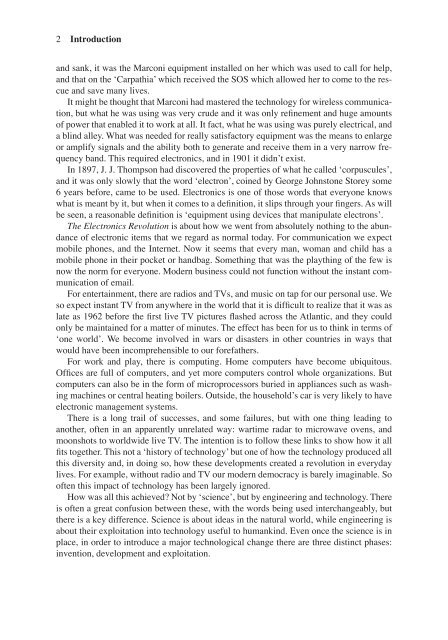The Electronics Revolution Inventing the Future
You also want an ePaper? Increase the reach of your titles
YUMPU automatically turns print PDFs into web optimized ePapers that Google loves.
2 Introduction<br />
and sank, it was <strong>the</strong> Marconi equipment installed on her which was used to call for help,<br />
and that on <strong>the</strong> ‘Carpathia’ which received <strong>the</strong> SOS which allowed her to come to <strong>the</strong> rescue<br />
and save many lives.<br />
It might be thought that Marconi had mastered <strong>the</strong> technology for wireless communication,<br />
but what he was using was very crude and it was only refinement and huge amounts<br />
of power that enabled it to work at all. It fact, what he was using was purely electrical, and<br />
a blind alley. What was needed for really satisfactory equipment was <strong>the</strong> means to enlarge<br />
or amplify signals and <strong>the</strong> ability both to generate and receive <strong>the</strong>m in a very narrow frequency<br />
band. This required electronics, and in 1901 it didn’t exist.<br />
In 1897, J. J. Thompson had discovered <strong>the</strong> properties of what he called ‘corpuscules’,<br />
and it was only slowly that <strong>the</strong> word ‘electron’, coined by George Johnstone Storey some<br />
6 years before, came to be used. <strong>Electronics</strong> is one of those words that everyone knows<br />
what is meant by it, but when it comes to a definition, it slips through your fingers. As will<br />
be seen, a reasonable definition is ‘equipment using devices that manipulate electrons’.<br />
<strong>The</strong> <strong>Electronics</strong> <strong>Revolution</strong> is about how we went from absolutely nothing to <strong>the</strong> abundance<br />
of electronic items that we regard as normal today. For communication we expect<br />
mobile phones, and <strong>the</strong> Internet. Now it seems that every man, woman and child has a<br />
mobile phone in <strong>the</strong>ir pocket or handbag. Something that was <strong>the</strong> plaything of <strong>the</strong> few is<br />
now <strong>the</strong> norm for everyone. Modern business could not function without <strong>the</strong> instant communication<br />
of email.<br />
For entertainment, <strong>the</strong>re are radios and TVs, and music on tap for our personal use. We<br />
so expect instant TV from anywhere in <strong>the</strong> world that it is difficult to realize that it was as<br />
late as 1962 before <strong>the</strong> first live TV pictures flashed across <strong>the</strong> Atlantic, and <strong>the</strong>y could<br />
only be maintained for a matter of minutes. <strong>The</strong> effect has been for us to think in terms of<br />
‘one world’. We become involved in wars or disasters in o<strong>the</strong>r countries in ways that<br />
would have been incomprehensible to our forefa<strong>the</strong>rs.<br />
For work and play, <strong>the</strong>re is computing. Home computers have become ubiquitous.<br />
Offices are full of computers, and yet more computers control whole organizations. But<br />
computers can also be in <strong>the</strong> form of microprocessors buried in appliances such as washing<br />
machines or central heating boilers. Outside, <strong>the</strong> household’s car is very likely to have<br />
electronic management systems.<br />
<strong>The</strong>re is a long trail of successes, and some failures, but with one thing leading to<br />
ano<strong>the</strong>r, often in an apparently unrelated way: wartime radar to microwave ovens, and<br />
moonshots to worldwide live TV. <strong>The</strong> intention is to follow <strong>the</strong>se links to show how it all<br />
fits toge<strong>the</strong>r. This not a ‘history of technology’ but one of how <strong>the</strong> technology produced all<br />
this diversity and, in doing so, how <strong>the</strong>se developments created a revolution in everyday<br />
lives. For example, without radio and TV our modern democracy is barely imaginable. So<br />
often this impact of technology has been largely ignored.<br />
How was all this achieved? Not by ‘science’, but by engineering and technology. <strong>The</strong>re<br />
is often a great confusion between <strong>the</strong>se, with <strong>the</strong> words being used interchangeably, but<br />
<strong>the</strong>re is a key difference. Science is about ideas in <strong>the</strong> natural world, while engineering is<br />
about <strong>the</strong>ir exploitation into technology useful to humankind. Even once <strong>the</strong> science is in<br />
place, in order to introduce a major technological change <strong>the</strong>re are three distinct phases:<br />
invention, development and exploitation.


















